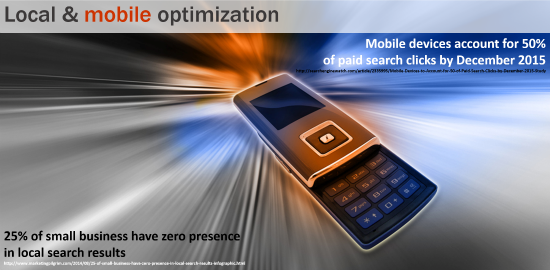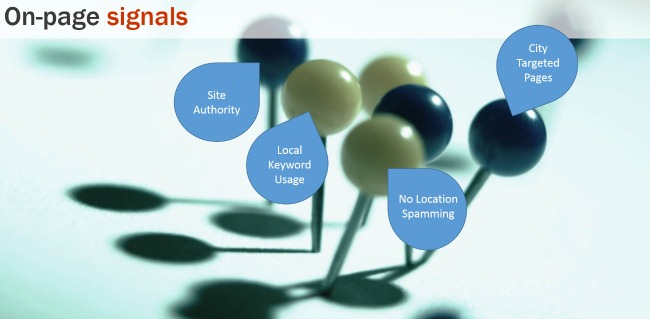Local and mobile optimization. While two different things, they go together like SEO and link building. They are no longer separate tactics or strategies within the realm of web marketing. They are thoroughly integrated into any true web marketing campaign.
This means that we can no longer “take a look” at local/mobile optimization “later.” They both need to be addressed, looked at, researched, and invested in now. Today. Presently.
As with any optimization, delay only leads to failure and a longer ramp-up time. Your competitors are jumping on the local/mobile bandwagon and earning their places as the most valuable sites. Unseating them may not be easy, and the longer they hold those positions, the harder it will be.
What is Local / Mobile Optimization?
Because most local searches are performed on mobile devices, local and mobile optimization tend to go hand in hand. Strictly speaking, mobile optimization is optimization for mobile devices, and local optimization is concerned with rankings within the local results. Local results frequently appear when performed on a desktop, and mobile searches tend to default to local results over the other organic listings.
Over the past several years, trends have been favoring mobile search results. Statistics show that mobile searches will account for a full 50% of all searches performed by the end of 2015. I would not be surprised if reality bears it out to be greater than that. Most mobile optimization is handled on the architectural end of a website. In short, it comes down to having a mobile-friendly website and ensuring page download speeds are lightning fast. Do those two things and your site will, by-and-large, be optimized for mobile. The rest is handled with local SEO, which is what I’ll spend the remainder of this post on.
Another frightening statistic tells us that very few businesses are optimized for local results. Not just on-page optimization, but any optimization. That means businesses have a long way to go to take advantage of the local traffic that they would greatly benefit from.
There are three main areas of optimization for local optimization. Each of these three areas has several avenues that you can focus on for optimization.
Tackling the On-Page Local Optimization Signals
All optimization starts with what you can do on the site. If you want something optimized, it’s always best to start with what you can do yourself and perfecting that as much as possible.
Site Authority: Both organic and local optimization rely heavily on site authority. That is, the value that others perceive your site to have. With standard organic optimization, you’re competing against a worldwide pool of sites that are also seeking to be the authoritative source. With local optimization, the pool is much smaller, making success easier to achieve.
But not only do you have less competition, it’s more strategically-focused competition. You don’t need to be an authority for any localities other than those where your business is located. I don’t need to be an SEO authority in Portland, Oregon, nor should I try to be. Local searchers are looking for a local company. I just need to target the Canton/Akron, Ohio area where my business is located.
That doesn’t in any way interfere with my national authority or presence. I still have that, but I also have a local presence to build on as well.
Local Keyword Usage: As with any keyword optimization, you need to use your geo-targeted keywords in your website if you want to rank for local searches. And just like all other keyword optimization, keyword stuffing and spamming is a non-starter. It’s not about how many times you can get your city/location names into your content but simply using on-page opportunity to target those areas how and where appropriate.
City Targeted Pages: One strategy that can work well, when done right, is to create targeted optimized pages for each city you wish to reach. This can easily become a spammy tactic if not done properly, so go for quality over quantity. If your company encompasses a very wide geographic location, don’t try to build a page for every city at once. Start with your biggest opportunities first. Make sure each page is unique in its own right and offers something of value to those who might look at multiple local pages. It’s all about the value!
Some Signals You Just Can’t Control
There are a number of off-site and 3rd party signals that factor into local search that you have no control over. Sometimes you just have to realize that you won’t be in the top spots for every search performed.
Proximity to City Center: How close is your business to the city center? This will weigh in on how close to the top you rank. Unless you’re willing to move your location to “downtown,” you will always be disadvantaged. Of course, that only covers one city. The only way to handle being closer to the city center is to open up legitimate offices in each city. And by “legitimate” I mean real offices with real people working from them.
Searcher Proximity to Business: The closer the searcher is to you when they perform their search, the higher you will rank. If you’re in the city center but the searcher is somewhere in the outskirts of the city, there is a high probability your result won’t land above another competing business closer to where they are. You’ll just have to get over that.
External Signals: There are also a number of external signals which you have some, but not complete, control over. These can include local links and citations, consistency of your name, address and phone number in local aggregators, and even being a part of local organization. Seek out these external signals to ensure your company information is noted correctly and consistently across all of them.
Customer Reviews Matter
If you’re not already soliciting customer reviews of your products and services, you should be. Local search algorithms rely pretty heavily on reviews when factoring in which sites deserve higher positions. Of course, the quality of the reviews matter a great deal as well. Search engines look for things such as the velocity, or frequency, of the reviews coming in, whether your keywords and/or local geographic keywords are written into the reviews, the diversity of the review sites that are showing reviews for your business, and the authority of the reviewer themselves.
In all, there is very little you can do to affect most of those issues, but what you can do as a business owner is to encourage customers to write reviews and find ways to make it easy to do so. We often encourage businesses to follow up with a post card asking customers to post a review. You can also do the same with an email and then link to several review sites so they can pick the one of their liking.
Don’t be afraid of negative reviews. Very rarely does a searcher trust all 5-star reviews. It looks suspicious, especially if these reviews are moderated on your own site. Be sure to allow negative postings and, if you see them on other sites, look for ways to “cure” the negativity with freebies or good customer service.
When soliciting reviews, encourage all reviewers to be open and honest about their experience. Let them know that you learn from their reviews and use them to improve your customer experience. One thing to stay away from, however, is offering compensation for the review. That can be seen as a form of buying positive reviews. Encourage, but don’t purchase reviews. Ever.
There is so much more to local and mobile optimization than could be addressed in this single post, but this gives you a good place to start digging in and updating your local presence. There truly is no optimization without including local optimization. Too many searches are done with local intent. Skipping local optimization means you’re missing out on this significant pool of business that would otherwise be led, perhaps literally, right to your door.
Stoney deGeyter
Latest posts by Stoney deGeyter (see all)
- Everyday Life Lessons That Guarantee Web Marketing Success - February 24, 2016
- Content is Meaningless – It’s The Messaging That Matters - January 13, 2016
- What Your Web Marketer Doesn’t Know (About You) Can Kill You - December 9, 2015
- The Pitfalls of a One-Man Web Marketing Band - November 3, 2015
- Mobile Content vs Desktop Content: What’s the Diff? - September 22, 2015


